Maintenance of What?

Part I
November 2018 - DAI Kitchen Presentation, ArnhemPerformative reading (dialogue), performed by Matthieu Blond (Sara: S) and Sara Cattin (Gregorio: G). Duration 20 min.
Video: https://vimeo.com/309137069
Part II
May 2019 - DAI Graduation Acts Performive reading (dialogue), performed by Olivia Arbacheli (Sara: S), Matthieu Blond (Sara: S) and Sara Cattin (Anonymous: X, Andrea: A), sound by Nicolò Tescari. Duration 25 min.
Workshop
May 2022 - VOCI IN CAMMINO (walking voices)Presentation
May 2023 - at Bulegoa z/b, Bilbao (Spain)I & II

This series of performances is part of broader research on transhumant pastoralism I started in 2018, conducting interviews with various people who work and live within the valleys of the province of Biella, the mountainous area in the North-West of Italy where I live and come from.
Part of this research is the MA thesis Reconnect, and Stay Alive. Leaving behind the idea of domain at the passage of roaming shepherds bublished at
https://www.neroeditions.com/staying-with-the-shepherd/

Transhumant pastoralism is a kind of semi-nomadic pastoral activity that raises animals while moving between the mountain tops and the low lands with a seasonal rhythm. In Biella, transhumant pastoralism shares its traditional territorial identity with the world of the capitalistic industry.
In Maintenance of What? I transformed the recording of the conversations I had with young shepherds into scripts. Questions go from “Do you listen to music when you are at the grazing?” to “What does it mean to maintain a mountain?” and “How does Europe undermine your autonomy?”.
The aim of the interviews is to learn about those embodied practices that are able to reconnect humanity to a physical reality, looking at things directly from the point of view of who works with land and navigates the web of private and public land property. By performing the scripts the project aims to create a collective moment for learning through the voices of those seeking for a social amplifier.

From the interviews:
S: Hi Gregorio!
![]() G: Hi Sara.
G: Hi Sara.
S: Do you wear a watch?
G: No. I’m allergic to time, and the phone too.
S: And do you like photography?
G: I almost never let people photograph me.
S: How long does your day last? At what time do you start?
G: When the light wakes me! I wake up with the sunrise and when the sunset comes I go to sleep.
(…)

(…)
X: Because when they are there all together you can hear them eating. If you are careful you don’t hear anything. But if you stay closer you hear a chaos, the noise they do. That’s the best part.
Then you have a lot of moments in which you just think. You think…
but it’s healthier…
S: Healthier than what?
(…)
the shepherds agree to the terms
in which their words will be used
workshop
The enquiry wants to investigate the relationship between walkers and pets, shepherds and live stock; the perception of a humanised “natural” environment; the concept of “guesting”: who is guiding who? Are the animals giuding us? Are we accompaining the shepherd or is he/she letting us to follow them?
The interviews happened while walking, guided by a set of visual and written guidelines that require the use of intuition and improvisation.
Hystorical-social context:
the workshop took place during the event Transumando organised by DocBI (research center of Biella) and Oasi Zegna.
The Zegna Group is an industrial establishment that between 1800 and 1900 constructed the road that connects the hight valley to the low lands, detenaning property over the natural area. Transumando invites people to embrace the ancient tradition of accompanying the shepherds in their seasonal trip from the city to the mountain pastures.
The Zegna family established industrial production of wool textile and male garments shaping the Valley’s landscape and pastoral society since 1910. Ermenegildo Zegna lead the Biellese XX century heavy industrialization and the Made in Italy textile production - high quality cashmere and merinos imported from Australia and Asia through british colonial trades - leaving a clear mark of how industrial capitalist ideology owns the right
to disrupt social and environmental ecologies. Since the earliest downfall of the industrial era, Biella had been transforming into a decadent scenario of abandoned lands and closed factories; the Sessera Valley, extracted of organic material and workforce, is now highly anthropical and exploited by organised turism

presentation


